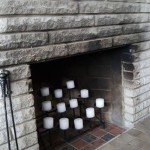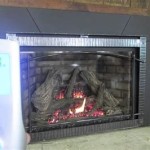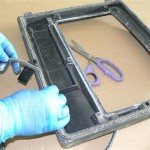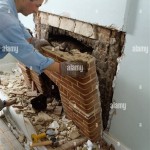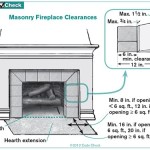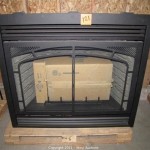Gas Fireplace Smells Like Rotten Eggs: Identifying and Resolving the Problem
A gas fireplace provides a convenient source of heat and ambiance within a home. However, the presence of a rotten egg smell emanating from the unit can be a serious cause for concern. This distinct odor is a strong indicator of a potential gas leak, and it requires immediate attention to ensure the safety of the occupants and the property.
Natural gas itself is odorless, making it difficult to detect leaks. To address this safety concern, gas companies add a chemical called mercaptan to the gas supply. Mercaptan has a strong, sulfurous smell similar to rotten eggs. This additive serves as a warning signal, alerting individuals to even small gas leaks before they can accumulate and create a hazardous situation.
When a rotten egg smell is detected near a gas fireplace, prompt action is crucial. Ignoring the odor can lead to serious consequences, including fire, explosion, and carbon monoxide poisoning. Understanding the potential causes of the smell and knowing the appropriate steps to take can help mitigate the risks and ensure the safe operation of the gas fireplace.
Identifying the Source of the Odor
The first step in addressing a rotten egg smell is to pinpoint its source. While the most likely cause is a gas leak, other factors can sometimes mimic the odor. A thorough investigation can help determine the true source and guide the appropriate course of action.
Begin by carefully examining the area around the gas fireplace. Sniff cautiously near the fireplace itself, the gas supply line, and any connections or fittings. Pay particular attention to areas where gas lines enter or exit the wall or floor. If the smell is strongest in a specific location, it is more likely that a leak is present near that point. It's critical to avoid using any open flames or electrical devices during this process, as they could ignite any accumulated gas.
Check other gas appliances in the house, such as the stove, water heater, and furnace. If the rotten egg smell is also present near these appliances, it could indicate a broader issue with the gas supply line to the house, rather than just a problem with the fireplace. In some cases, stagnant water in a drain can produce a similar sulfurous odor. Run water in nearby sinks and showers to rule out this possibility. If the smell disappears after running water, it is likely a drainage issue and not a gas leak.
Another potential, though less common, source of a rotten egg smell near a gas fireplace is a dead animal trapped within the chimney or venting system. As the animal decomposes, it can release gases that mimic the smell of sulfur. Inspecting the chimney and vent for any signs of animal activity and removing any debris can help eliminate this possibility. It is important to take proper safety precautions when inspecting or cleaning a chimney, including wearing protective gear and ensuring adequate ventilation.
Immediate Actions to Take When a Gas Leak is Suspected
If the source of the rotten egg smell is suspected to be a gas leak, immediate action is necessary to protect the safety and wellbeing of everyone in the building. The first and most critical step is to evacuate the premises. Do not attempt to locate the leak yourself or tamper with any gas lines or appliances.
Once outside, immediately contact the local gas company or fire department. Provide them with as much information as possible about the smell, its location, and any other relevant details. The gas company or fire department will have the necessary equipment and expertise to safely locate and repair the leak. It is crucial to allow them to handle the situation to prevent further hazards.
Do not re-enter the building until the gas company or fire department has given the all-clear. They will thoroughly inspect the premises, identify the source of the leak, and ensure that it has been properly repaired. It is imperative to follow their instructions and refrain from using any gas appliances until they have been deemed safe to operate.
Before re-entering the building, open all windows and doors to ventilate the area thoroughly. This will help to dissipate any remaining gas and reduce the risk of explosion. It is also advisable to have the gas company or a qualified technician inspect all gas appliances to ensure they are functioning correctly and safely.
Preventative Measures and Maintenance
Regular maintenance and preventative measures can help minimize the risk of gas leaks and ensure the safe operation of a gas fireplace. These measures include routine inspections, cleaning, and professional servicing.
Schedule annual inspections of the gas fireplace by a qualified technician. The technician will inspect the gas lines, connections, and venting system for any signs of damage or deterioration. They will also clean the unit, check the burner operation, and ensure that all safety features are functioning correctly. Regular inspections can help identify potential problems before they escalate into major issues.
Keep the area around the gas fireplace clean and free of obstructions. Do not store flammable materials near the unit. Ensure that the venting system is clear of debris and obstructions, such as leaves, bird nests, or snow. A blocked vent can cause carbon monoxide to build up inside the home, creating a serious health hazard. Clean the glass on the fireplace regularly to maintain visibility and prevent soot buildup.
Install carbon monoxide detectors throughout the home, especially near sleeping areas. Carbon monoxide is a colorless, odorless gas that can be deadly. Detectors provide an early warning of elevated carbon monoxide levels, allowing occupants to evacuate the building and seek medical attention. Test the detectors regularly to ensure they are functioning properly. Replace the batteries in the detectors at least twice a year.
If any unusual noises, smells, or performance issues are noticed with the gas fireplace, address them promptly. Do not attempt to repair the unit yourself unless you are a qualified technician. Contact a professional for assistance. Ignoring minor problems can lead to more significant issues and potentially dangerous situations.
Familiarize yourself with the signs of a gas leak and the appropriate actions to take. Ensure that all family members are aware of the procedures. Post emergency contact numbers near the gas fireplace and other gas appliances. By taking these preventative measures, you can help ensure the safe and efficient operation of your gas fireplace and protect the safety of your home and family.

Gas Fireplaces The Odors They Can Cause

4 Signs You Can Use Professional Gas Fireplace Maintenance

Gas Fireplaces The Odors They Can Cause

Gas Fireplace Leak Symptoms What To Watch Out For Dreifuss Fireplaces

Gas Fireplace Leak How To Detect And What Do Dreifuss Fireplaces

5 Signs Your Gas Fireplace Needs Professional Maintenance

Gas Fireplace Leak Symptoms What To Watch Out For Dreifuss Fireplaces

Gas Fireplaces The Odors They Can Cause

Why Does My Gas Fireplace Smell Like Kerosene Hunker

Gas Fireplace Leak Symptoms What To Watch Out For Dreifuss Fireplaces
Related Posts

